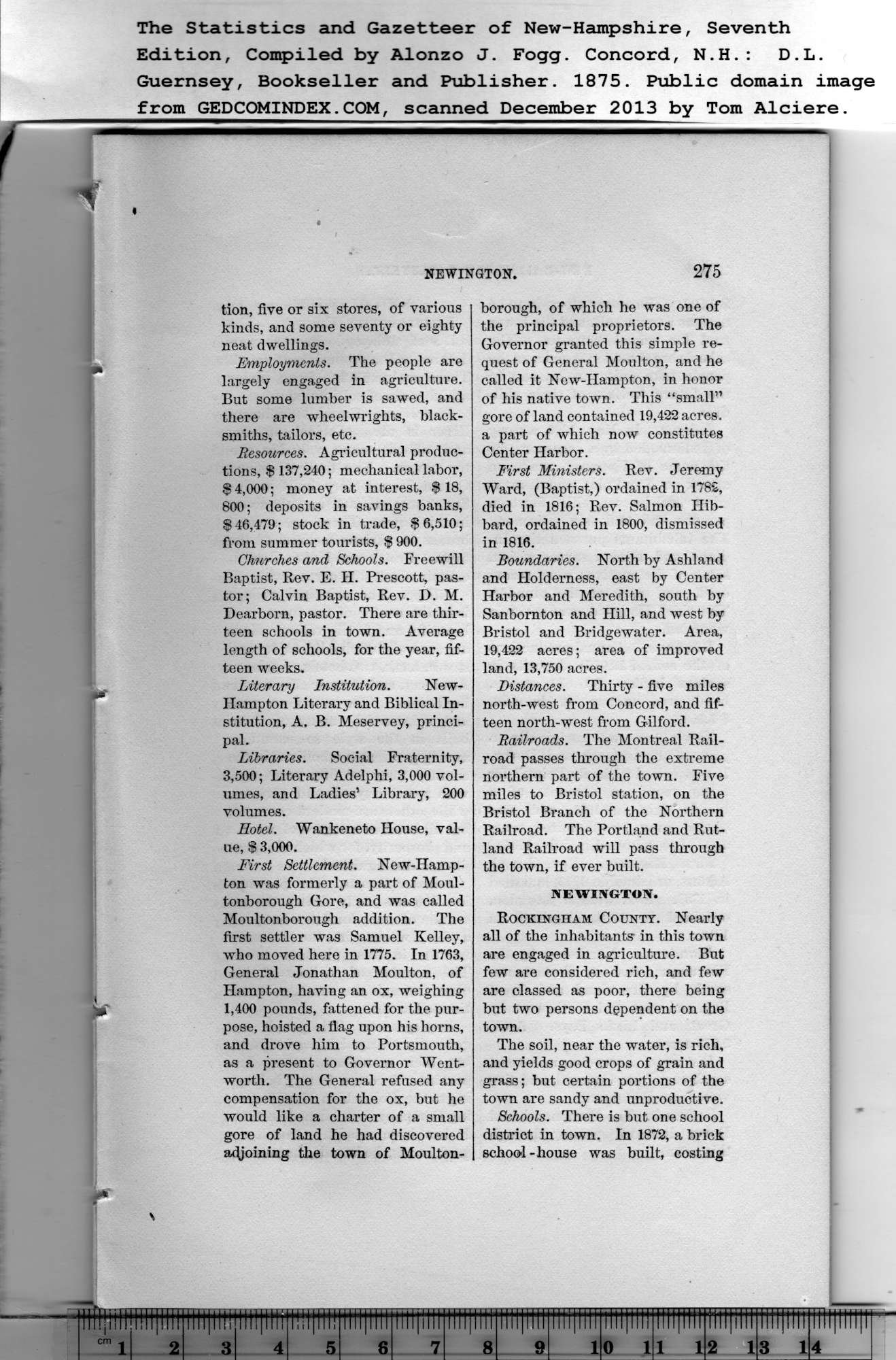|
tion, five or six stores, of various
kinds, and some seventy or eighty
neat dwellings.
Employments. The people are
largely engaged in agriculture.
But some lumber is sawed, and
there are wheelwrights, black-
smiths, tailors, etc.
Resources. Agricultural produc-
tions, $ 137,240; mechanical labor,
$ 4,000; money at interest, $ 18,
800; deposits in savings banks,
$ 46,479; stock in trade, $ 6,510;
from summer tourists, $ 900.
Churches and Schools. Freewill
Baptist, Rev. E. H. Prescott, pas-
tor; Calvin Baptist, Rev. D. M.
Dearborn, pastor. There are thir-
teen schools in town. Average
length of schools, for the year, fif-
teen weeks.
Literary Institution. New-
Hampton Literary and Biblical In-
stitution, A. B. Meservey, princi-
pal.
Libraries. Social Fraternity,
3,500; Literary Adelphi, 3,000 vol-
umes, and Ladies’ Library, 200
volumes.
Hotel. Wankeneto House, val-
ue, $ 3,000.
First Settlement. New-Hamp-
ton was formerly a part of Moul-
tonborough Gore, and was called
Moultonborough addition. The
first settler was Samuel Kelley,
who moved here in 1775. In 1763,
General Jonathan Moulton, of
Hampton, having an ox, weighing
1,400 pounds, fattened for the pur-
pose, hoisted a flag upon his horns,
and drove him to Portsmouth,
as a present to Governor Went-
worth. The General refused any
compensation for the ox, but he
would like a charter of a small
gore of land he had discovered
adjoining the town of Moulton-
borough, of which he was one of
the principal proprietors. The
Governor granted this simple re-
quest of General Moulton, and he
called it New-IIampton, in honor
of his native town. This “small”
gore of land container! 19,422 acres,
a part of which now constitutes
Center Harbor. |
First Ministers. Rev. Jeremy
Ward, (Baptist,) ordained in 178S,
died in 1816; Rev. Salmon Hib-
bard, ordained in 1800, dismissed
in 1816.
Boundaries. North by Ashland
and Holderness, east by Center
Harbor and Meredith, south by
Sanbornton and Hill, and west by
Bristol and Bridgewater. Area,
19,422 acres; area of improved
land, 13,750 acres.
Distances. Thirty - five miles
north-west from Concord, and fif-
teen north-west from Gilford.
Railroads. The Montreal Rail-
road passes through the extreme
northern part of the town. Five
miles to Bristol station, on the
Bristol Branch of the Northern
Railroad. The Portland and Rut-
land Railroad will pass through
the town, if ever built.
NEWINGTON.
Rockingham County. Nearly
all of the inhabitants' in this town
are engaged in agriculture. But
few are considered rich, and few
are classed as poor, there being
hut two persons dependent on the
town.
The soil, near the water, is rich,
and yields good crops of grain and
grass; hut certain portions of the
town are sandy and unproductive.
Schools. There is but one school
district in town. In 1872, a brick
school-house was built, costing |
